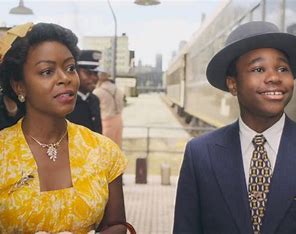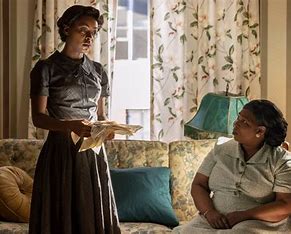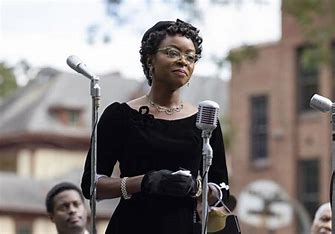The 2023 Best Actress Oscar Goes To…
Our pick: Danielle Deadwyler
Filmed in extreme closeup by Chukwu, she is a force of nature when she describes how a mother will always know her child no matter how bruised and bloodied the body. And as she reaches the volta of her magnificent speech, she does something extraordinary; she closes her eyes, and her eyelids twitch a little.
Danielle Deadwyler’s phenomenal performance as Mamie Till-Mobley, the mother of Emmett Till, is the stuff that Oscar’s dreams are made of. Till-Mobley channeled her grief into activism after the lynching of her 14-year-old son while he was on vacation in Mississippi in 1955, and as Deadwyler takes us on that journey, we are inside her skin. In what could otherwise have been an unremarkable movie (directed by Chinonye Chukwu from a screenplay by Michael Reilly, Keith Beauchamp, and Chinonye), Deadwyler elevates the material into the realm of the extraordinary. It’s an unforgettable performance for the ages.
The film’s opening shot, in which Mamie and Emmett (she always calls him by his nickname Bo) sing along to “Sincerely” by the Moonglows on the car radio as she drives along the Chicago streets, immediately shows us that Mamie’s life revolves around her son who newcomer Jalyn Hall beautifully plays. However, you can also see the worry in her eyes – Emmett is going on vacation to be with his cousins in Mississippi, a holiday set up by her mother Alma (Whoopi Goldberg, exceptionally good in a small role) because she thinks that he should know where he came from. Mamie, on the other hand, is instinctively against it. There are echoes here of Sharon Stone’s tremendous and vastly underrated performance as Olivia Mazursky, the mother of Zack Mazursky (Anton Yelchin), the young teenage boy who is senselessly taken hostage and killed because of his stepbrother’s trifling drug debts in director Nick Cassavetes “Alpha Dog.”

Emmett will be accompanied on the trip and stay with the family of Mamie’s uncle Mose (John Douglas Thompson), also known as Preacher.
As Hall portrays, Emmett is a sweet young man, if a little spoilt. He loves music (singing along has helped him overcome a stutter) and likes to goof around. His penchant for doing playful things will have chilling consequences elsewhere. There is also a naiveté about him, and although Chicago itself is no stranger to racism, he seems calm and impatient when Mamie tries to warn him that things are different in Mississippi and that he must be careful around the white folks down there.
The killing of Emmett Till is one of the most chilling and horrendous reminders of this country’s history of racial hatred, which is ongoing to this day. What exactly happened in Bryant’s store in the sharecropper town of Money, Mississippi, we will never know for sure. The Bryants were a white couple, but their clientele was exclusively Black. The way “Till” presents it, Emmett, playacting as usual, tells Carolyn Bryant (a fat-padded Haley Bennett), who is at the cash register, that she looks like a movie star. Then, seconds later, as he and his cousins are about to depart, he wolf-whistles at her (Bryant’s testimony, in which the defense coached her and which we see a little of here, maintained that there was physical contact). Offended, Bryant retrieves a shotgun as Emmett and his cousins frantically run to their car and drive away.

For three days, nothing. Emmett’s vacation is ending. Then in the middle of the night, there is a pounding on the door of Preacher’s home, and two armed white men take Emmet away and put him in the back of their pickup.
Chukwu decided not to show the lynching. However, we do hear Emmett’s bone-chilling screams. When, after much bureaucratic shuffling, Emmett’s body is finally returned to Chicago, Mamie makes what turns out to be a crucial decision and a seminal one for the Civil Rights/NAACP movement: she will have an open casket for Emmett’s funeral so the world can see what the State of Mississippi did to him.
It is in her moments as the grieving mother that Deadwyler comes into her own. The scene where she is alone with Emmett’s horrifically mutilated corpse – there is also a shotgun wound to the head and face – is a tour de force, even if there has been a lot of discussion about whether showing Emmet’s body was in poor taste on the part of the director. When the scene began, I thought we would get a fleeting glimpse of Emmett. Gradually, however, the camera moves in. Mamie caresses her son’s body, slowly moving her hand from his feet to his head due to the exceptionally graceful way Chukwu and Deadwyler handled the scene. And I would find it difficult to understand why anyone would find it in poor taste.

Insisting on going to the trial in Mississippi, Deadwyler does a stunning turn on the witness stand. Filmed in extreme closeup by Chukwu, she is a force of nature when she describes how a mother will always know her child no matter how bruised and bloodied the body. And as she reaches the volta of her magnificent speech, she does something extraordinary: she closes her eyes, and her eyelids twitch a little. I swear, I just lost it at that point.
We know from our history books (and it is apparent in the movie) that the murderers got off scot-free. They even sold their story to Life magazine, where they admitted killing Emmett but once proven innocent… Carolyn Bryant, alive to this day, has never been investigated by the police. It took sixty-seven years for the Emmett Till Anti-Lynching Act to take effect in March 2022! It could happen again!

















